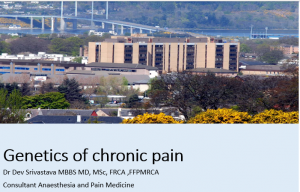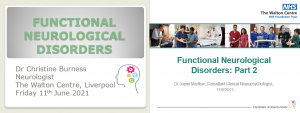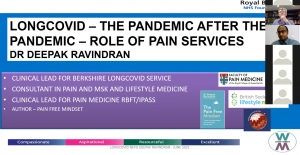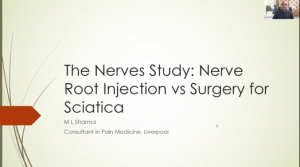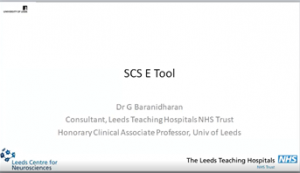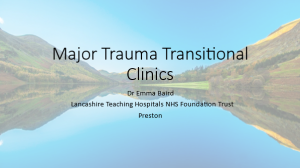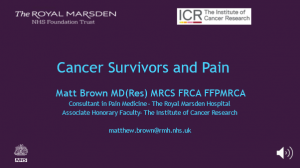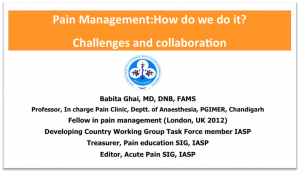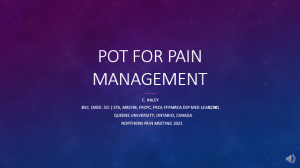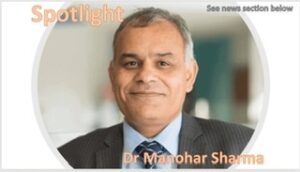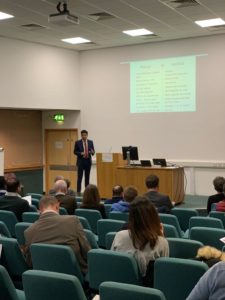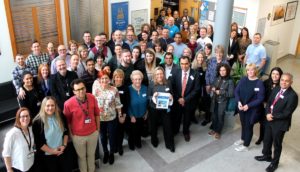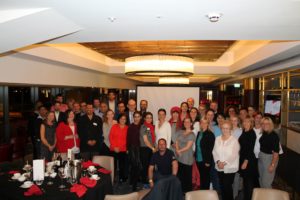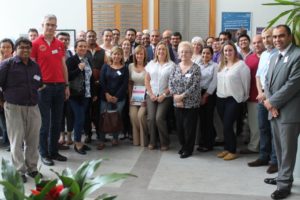
𝐏𝐀𝐈𝐍 𝐍𝐄𝐔𝐑𝐎𝐌𝐎𝐃𝐔𝐋𝐀𝐓𝐈𝐎𝐍 𝐀𝐖𝐀𝐑𝐄𝐍𝐄𝐒𝐒 𝐃𝐀𝐘 𝟐𝟔𝐭𝐡 𝐉𝐀𝐍𝐔𝐀𝐑𝐘 𝟐𝟎𝟐𝟒
Back Up And Running – The 36th Annual ‘Clinical Management Of Chronic Pain Course
Due To COVID it has been 3 years since we held the last Liverpool Course Annual Pain Course on Management of Chronic Pain but we are back up and running. We have just successfully completed the 36th Liverpool Course Annual Pain Course on Management of Chronic Pain on 6th – 7th July. Organised under the new leadership of Dr Hemkumar Pushparaj, along with Dr Manohar Sharma both Consultants in pain Medicine at the Walton Centre NHS Foundation Trust.
The course consisted of a varied range of educational activities including workshops, clinics, and grand round with patient interaction and was attended by a number of disciplines which included, Consultants, GP’s, Anaesthetists, Nurses and Physiotherapists from both the UK and internationally.
The Course was well supported in terms of logistics by The Walton Centre Management Team, the Pain Service and other disciplines with additional support from secretaries, PMP team, Radiology, Theatres, Jefferson ward, OPD in Sid Watkins and of course not forgetting the many patients who also took part.
The Pain Relief Foundation is committed to continually supporting this event and would like to thank you all as this task can only made only possible by your contribution hard work and dedication.
We would also like to thank Dr John Hughes for delivering the ‘Sam Lipton Lecture’ his presentation ‘Pain Medicine Services in the UK: A vision for the future’ made the evening most educational and entertaining.
“Interventional Procedures and Neuromodulation Workshop for Pain Management- InProNeuromod 2023”

AN EVENT NOT TO BE MISSED!
This event is organized by the Department of Anaesthesia and Intensive Care at PGIMER, Chandigarh, in collaboration with the esteemed Department of Anaesthesia and Pain Management at Toronto Western Hospital, University of Toronto, as well as the renowned Pain Relief Foundation in Liverpool.
Taking place on the 21st and 22nd of October 2023, at the esteemed PGIMER Chandigarh, this workshop aims to provide valuable insights and hands-on experience in interventional procedures and neuromodulation techniques for effective pain management. We are honoured to host a distinguished panel of international faculty members from Canada, the United Kingdom, Singapore, and the United States, who will share their expertise and knowledge with us. Additionally, we are fortunate to have esteemed national experts who will also contribute their insights to enrich this academic feast.
To read the full programme and how to register click the link below
or scan the QR code
EFIC Winter Cancer Pain School, 4th – 7th October 2022. What a success!
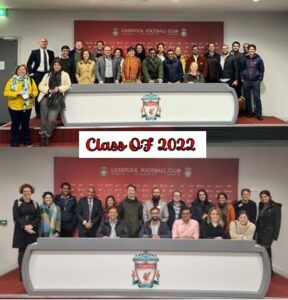
Our first face to face meeting since the pandemic and what a success it was.
It was great pleasure to have delegates and Faculty from both the UK and Europe in Liverpool on this course over an extremely busy 4 days. There was excellent interaction between all participants with a great passion and enthusiasm to learn from each other on this course and to find ways to improve cancer pain management in Europe. It was an excellent group with faculty from Europe and UK which provided very balanced flavour throughout this interactive meeting.
It is a rare and unique opportunity to share knowledge and experience in this field in such detail (lectures, case discussions, live case presentations on recently treated cases, pain in cancer survivors, group work etc). I am sure this will make positive impact on those who attended, to further help patients with cancer related pain in UK and Europe.
The course was organised by Dr Manohar Sharma a Trustee of the Pain Relief Foundation and a Consultant in Pain Medicine at the Walton Centre, Liverpool, Dr Kate Marley, Consultant in Palliative Medicine, University Hospital Aintree, Liverpool, Mr Jibril Osman-Farah, Consultant Neurosurgeon, The Walton Centre NHS Foundation Trust, Liverpool, Professor Bart Morlion, Director of the Leuven Centre for Algology & Pain Management, University Hospitals Leuven, Belgium and Dr Brona Fullen EFIC President, Associate Professor in the UCD School of Public Health, Physiotherapy and Sports Science, Dublin.
The Pain Relief Foundation would like to take the opportunity to thank the entire faculty in particular Dr Sharma, Dr Marley and Dr Fullen for all your hard work, and commitment as without you we would not be able to hold such events.
Even with delays of Covid this event was in great demand with over double the amount of people wanting to attend and it has proven yet again to be a huge success and was well received by all the participants, and I am delighted to say that the feedback is excellent and reflects your valuable contribution and support.
Last but not the least thanks to EFIC for supporting this and Industry sponsors to make this course viable.
Comments from the course
♦ Excellent content and focus on MDT.
♦ For providing such a detailed presentation of interventional management of cancer pain something which lacks in my country.
♦ Would be very relevant for palliative care physicians and specialist nurses to be more aware of potential interventional options at an earlier stage.
♦ It will help increase awareness of early interventional management of pain and help to organise and activate a multidisciplinary team.
♦ Best course in years
♦ Knowing the different techniques and possibility we can use with every single patient seems more than important to me. The more we are aware of what we can do, the more we can be reactive. Also, this kind of course allows us to review the literature together and point out where we have a lack of source. This may give us some ideas for our future research.
The North England Pain Group Meeting face to face is back up and running and what a great day!

A reminder that the North of England Pain Medicine Group is a supraregional Pain Medicine group established to cater specifically for the unique educational and networking needs of Pain Physicians in the locality of the North of England. The Group set up originally bey Dr’s Sanjeeva Gupta & Manohar Sharma aims to foster closer collaboration between Pain Physicians to promote areas of good practice. It encourages and supports speakers and delegates drawn primarily from the region, contributing to an annual one day meeting of the highest quality.
This year’s meeting was held back in the usual location of Huddersfield and again has proved to be a resounding success proving why this meeting has fast become a most important date in the annual pain conference calendar. Topics from this year’s programme included, ‘Gynaecology Mesh –Funded MDT service for complex pain’, ‘Cauda Equina Syndrome.’ , ‘Faculty of Pain Medicine (FPM) updates and procedures for Large joint pain .
Listed below are feedback comments received from attendees:-
What did you enjoy most about today?
Variety of topics and the clear presentation with appropriate audio visuals
Networking
Excellent speakers and well thought topics
Chance to meet colleagues
Enjoyable chance to network, particularly enjoyed the medico-legal and the presentation on pragmatic pain
Whole range of topic conversation
Appropriate duration of talks, educational, relevant and well presented. Thank you.
Presentations and networking especially after Covid
All of it
Medico-legal aspects
EUROPEAN PAIN FEDERATION EFIC® CANCER PAIN SCHOOL, LIVERPOOL
4th to 7thOctober 2022
Course Aims
This course aims to develop skills of assessing and treating pain related to cancer and its treatment. This interactive course develops an evidence-based approach to assessment, and formulating diagnosis and designing a comprehensive management plan including pain management. The emphasis is on a multidisciplinary approach to managing pain related to cancer. Learning objectives of this course are in line with EFIC Core Curriculum for managing pain related to cancer as below.
- Identify sociocultural influences on the experience of cancer and cancer-related pain.
- Be able to compare and contrast the assessment and management of persons with cancer related pain and those with chronic non-cancer pain.
- Recognise the problems faced by cancer survivors who have persistent pain and management principles.
- Discuss the meaning and significance of the World Health Organisation analgesic algorithm for pain in cancer.
- Show awareness of and addressing unpleasant end-of-life symptoms including but not limited to, pain, nausea/vomiting, respiratory distress and itch.
- Recognise the essential role of close liaison with other teams, specifically from oncology, radiation oncology, neurosurgery, anaesthesia and palliative medicine.
- Define and distinguish between incident and incompletely relieved persistent pain.
- Discuss the role of cancer therapies in the management of cancer-related pain, including but not limited to: Radiotherapy, Radiopharmaceuticals, Chemotherapy, Immune therapy and Surgery.
- Discuss the use of other adjuvant analgesics in cancer pain including but not limited to: bisphosphonates, corticosteroids and ketamine.
There will be ample opportunity to interact with course faculty throughout the course
Click here for a detailed programme
For further information on the European Pain Federation (EFIC) please click here
Who Should Attend:
Trainees from Anaesthetic, Neurosurgery, Pain and Palliative Medicine. Consultants/Specialists in Pain Medicine, Palliative Medicine, GPs, Advanced Nurse Practitioners, and Senior Physiotherapists with a specialist interest in the management of chronic pain. Scientists, Pharmacists and other non-medical personnel with a professional interest in relation to management of pain related to cancer.
Royal College of Anaesthetist’s CPD approval (20 points) & Revalidation Matrix category:
2E03 Basic assessment and management of chronic pain
3E00 “Specialist interest area in Cancer Pain”
EFIC Curriculum CPD Matrix
EFIC core curriculum for Pain Medicine mapping
Course Material:
The Course Handbook will be available on the PRF Webpage with the lecture slides and carefully selected references (Available during the course and for 4 weeks after the course, to participants using a secure link via drop box).
Fee:
£450 – until 5th August 2022: then £525 (includes lunch and dinner)
Hotel Accommodation:
There are limited spaces available at the Radisson Blu Hotel at the discounted rate of £110.00 per night including breakfast. Should you wish to take advantage of his offer please use the link below when you register.
Alternatively there are a large number of hotels nearby in Liverpool city centre including premier inns and travel lodges.
To register online please visit http://www.painrelieffoundation.org.uk/events/
12TH ANNUAL NORTH ENGLAND PAIN MEDICINE GROUP
MEETING A RESOUNDING SUCCESS
This year’s meeting was very different for two reasons; the first being it was held virtually (zoom) and secondly for the first time it was international which saw delegates attend from India and Canada and has proved to be a resounding success as you can see from the comments below.
Topics from this year’s programme included, “Genetics and Chronic Pain’, ‘Functional Neurological Disorder and Chronic Pain: Similarities and Differences’ and ‘Long Covid – The Pandemic after The Pandemic. Do pain services have a role? ’ to name but a few.
‘Really enjoyed the virtual meeting and topics were very interesting.’
‘I learnt a lot’
‘The format over video worked very well – Varied topics and presenters’
‘The conference provided with a varied choice of topics and this kept me engaged’
‘All presentations were enjoyable’
‘Thank you for organizing such an enjoyable and interesting meeting’
‘Variety of subjects covered’
‘Enjoyed the convenience of attending from home ’
‘It was an excellent day and I thoroughly enjoyed it’
To view each presentation recorded on the day, please click on the pictures below.
For further information regarding the North England Pain Medicine Group please visit their website at www.north-england
Manohar Sharma Spotlight
Pain Neuromodulation
The Walton Centre has been involved in Reactiv8 Implant to strengthen the back muscles (multifidus muscles) to improve chronic lower back pain. This implantable device includes a wire (lead) with electrodes stimulating nerves controlling the back muscles. These wires are powered by an implanted battery which last about 5 years. We now have prospectively collected outcome data over 24 months in 12 patients. Overall there has been a positive outcome in several patients with an improved level of pain, physical activity and satisfaction with the treatment. In these cases otherwise pain relief options are limited. Another large multicenter randomized sham controlled trial has now demonstrated significant improvement in lower back pain comparing active treatment with Reavtiv8 implant. Therefore the Food and Drugs Administration (FDA) has given approval for Reactiv8 Implant to be used to help mechanical back pain as a safe and clinically effective treatment. This new treatment is now available in the UK on the National Health Service in several leading pain clinics. The Walton Centre is currently working on developing a patient care pathway to implement this highly specialized treatment by selecting appropriate cases that are likely to benefit most from this new implantable treatment to help sufferers of chronic mechanical lower back pain.
A number of other research projects on spinal cord stimulation technique with other pain units are awaiting resumption of research activity due to COVID-19 pandemic.
Cancer Pain
2020 had an excellent start for the year with organization of an interdisciplinary study day to treat refractory cancer pain with neuroablative techniques. Around 50 national and international delegates attended to share their expertise. Live videos of interventional cancer pain techniques including cordotomy, spinal neuroablative blocks and neurosurgical techniques including thalamotomy were presented. The focus was on practical technical aspects so that delegate can refine their skills as otherwise opportunities to learn are scarce. This generated huge interest and discussion benefitting all attendees. The Faculty was from across the world and some presenting via remote video link.
The National Cervical cordotomy Registry for which The Walton Centre contributed the data for the last several years has now been published with the outcomes showing significant improvement in pain as well as significant reduction in the amount of pain killers required to manage refractory pain with better quality of life. The Walton Centre has published its own prospective outcome results following cordotomy for the period of two years with multimodal evaluation.
Another ongoing study with cervical cordotomy is evaluating the neurophysiological effects of cordotomy to correlate with structural lesion location and size with pain relief demonstrated by the patients.
The award winning Cancer Pain Handbook is undergoing further update for the second edition and is due for publication by Oxford University Press in 2021.
Spinal pain
A large multicenter randomized trial (NERVES trial) comparing clinical outcomes and cost effectiveness following surgical microdiscectomy and nerve root injection (epidural) has concluded. In a large series of cases with persistent sciatica of less than 12 month duration has demonstrated significant surgery sparing benefit of nerve root epidural steroid injections over 12 months evaluation period. The study has now been submitted for publication and is likely to influence national pathway for management of sciatica.
Another large multicenter trial to evaluate clinical and cost effectiveness of lumbar denervation (RADICAL trial) is about to start and is in the initial stages. There has been some delay due to the COVID19 pandemic. However, this study is likely to be a key in the field of pain medicine to assess the utility or lack of utility of lumbar radiofrequency denervation treatment for back pain which is currently offered as a routine on the National Health Service but is under threat of decommissioning due to concerns over its evidence. My contribution to publications over the last 12 months can be viewed here publications section
What a great start to 2020 with such a niche workshop “Neuroablative Techniques for Cancer Pain”
What a great start to 2020 with such a niche workshop “Neuroablative Techniques for Cancer Pain”. What started out as a maximum of 25 delegates almost doubling to 46 along with Faculty and not forgetting the support from sponsors we had in excess of 60 people in attendance
The lead organiser of this study day was Dr Manohar Sharma (Consultant in Pain Medicine, The Walton Centre NHS Foundation Trust (WCFT), Liverpool, in conjunction with the Faculty from the WCFT Pain Team Dr Rajiv Chawla and Neurosurgery Team Mr Jibril Osman Farah and Dr Kate Marley, Consultant in Palliative Medicine, University Hospital Aintree, Liverpool.
The study day aimed to promote education on technical aspects of advanced neuroablative pain relief interventions for cancer related pain for tier 3 and 4 services. Guidance from FPM supported by Association for palliative Medicine, Association of Cancer Physicians and Clinical Oncology is freely available at https://www.rcoa.ac.uk/news-and-bulletin/rcoa-news-and-statements/fpm-release-framework-pain-services-cancer-and-life
This study day expected that attendees had a basic understanding of when a cancer pain relief intervention is indicated. This day will build on attendees’ existing knowledge of pain relief interventions to take it to higher level and to develop interdisciplinary cancer pain management services in their region to fulfil unmet need as highlighted by recent publication by FPM. In our view Professional’s learning by collaborative working in this complex and challenging field is paramount to improve confidence in setting up and developing interdisciplinary working. This study day will also cover some of the rarely performed, but, most effective neuroablative neurosurgical pain relief techniques for cancer related pain and chronic pain.
On behalf of the Pain Relief Foundation I would like to take the opportunity to thank you for participating in the Study day and making it another triumph without your conscientiousness, devotion and commitment the course would not be possible. It is both a pleasure and delight to work with such talented people and to see such team work in educating other health professionals not only locally but nationally in these particularly challenging times.
Manohar and the organising team thank you for creating the programme and trusting us again at the PRF to help you deliver another superb course and thank you for the challenge of having an international speaker Mr Viswanathan via satellite that kept us on our toes right up until last minute
Having had a quick look at the evaluation it appears the course has been well received by all the participants with good feedback,
Once again a huge thank you to you all
My sincere thanks & best wishes
David Cain
Chairman

EUROPEAN PAIN FEDERATION EFIC® WINTER CANCER PAIN SCHOOL 2020
Coming soon to Liverpool 6th – 9th October 2020 so be sure to save the dates.
To view the programme of events click here
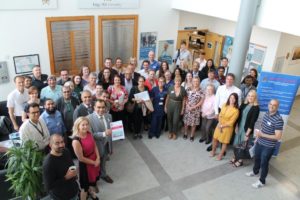
Successful Completion Of The 35th Annual
‘Clinical Management Of Chronic Pain Course 2019’
The 35th Liverpool Course Annual Pain Course on Management of Chronic Pain was held 4th – 6th July. Organised under the new leadership of Dr Rajiv Chawla, along with Dr Manohar Sharma both Consultants in pain Medicine at the Walton Centre NHS Foundation Trust.
The course consisted of a varied range of educational activities including workshops, clinics, and grand round with patient interaction and was attended by a number of disciplines which included, Consultants, GP’s, Anaesthetists, Nurses and Physiotherapists from both the UK and internationally.
The Course was very well supported in terms of logistics by The Walton Centre Management Team, the Pain Service and other disciplines with additional support from secretaries, PMP team, Radiology, Theatres, Jefferson ward, OPD in Sid Watkins and of course not forgetting the many patients who also took part.
The Pain Relief Foundation is committed to continually supporting this event and would like to thank you all as this task can only made only possible by your contribution hard work and dedication.
We would also like to thank Dr Andreas Goebel for delivering the ‘ Sam Lipton Lecture’ his presentation ‘Autoantibodies in Primary Chronic Pain’ made the evening most educational and entertaining.
Please click here to see the written course feedback from course delegates or here to see the photo gallery

Neuroablative Techniques For Cancer Pain
Friday 7th February 2020
Venue:
Clinical Sciences Centre, University Hospital Aintree, Liverpool
Course Aims:
Further to publication of framework for pain services for cancer and life-limiting disease by the Faculty of Pain Medicine (FPM) of the Royal College of Anaesthetists; this study day aims to promote education on technical aspects of advanced neuroablative pain relief interventions for cancer related pain for tier 3 and 4 services. Guidance from FPM supported by Association for palliative Medicine, Association of Cancer Physicians and Clinical Oncology is freely available at https://www.rcoa.ac.uk/news-and-bulletin/rcoa-news-and-statements/fpm-release-framework-pain-services-cancer-and-life
This study day expects that attendees have basic understanding of when a cancer pain relief intervention is indicated. This day will build on attendees’ existing knowledge of pain relief interventions to take it to higher level and to develop interdisciplinary cancer pain management services in their region to fulfil unmet need as highlighted by recent publication by FPM. In our view Professional’s learning by collaborative working in this complex and challenging field is paramount to improve confidence in setting up and developing interdisciplinary working. This study day will also cover some of the rarely performed, but, most effective neuroablative neurosurgical pain relief techniques for cancer related pain and chronic pain.
Who Should Attend:
Advanced Pain, Palliative medicine, Oncology and Neurosurgery trainees; Clinicians and Consultants managing complex Cancer related Pain and Chronic Pain and aiming to set up the service offering similar interventions
Click here to view a detailed programme of events.
Fees: £150
Limited to 30 Participants
Those who should attend are Advanced Pain, Palliative medicine, Oncology and Neurosurgery trainees; Clinicians and Consultants managing complex Cancer related Pain and Chronic Pain and aiming to set up the service offering similar interventions.
For further information you can visit https://painrelieffoundation.org.uk/events/
or Click here to register online
An Incredible Start to 2019
Demystifying Management of Complex Spinal Pain Study day
What a fantastic start to the year including Faculty and Delegates we had in excess of 90 people attending our first workshop of 2019 ‘Demystifying Management of Complex Spinal Pain’.
This study day was the first Complex Spinal Pain Study day to be organised by Dr Manohar Sharma (Consultant in Pain Medicine, The Walton Centre NHS Foundation Trust (WCFT), Liverpool, in conjunction with the Faculty from the WCFT Pain Team and Neurosurgery Team with additions from Dr Stephen Ward, Consultant in Pain Medicine, Brighton and Sussex University Hospitals, Dr Denis O’Brien, GPwSI in Musculoskeletal Medicine & clinical advisor for Liverpool CCG, The Elms Medical Centre, Liverpool and ourselves and what a success it was. The workshop attracted 80 delegates and 13 Faculty from all disciplines from across the UK with people turning up to register on the day
Management of back and leg pain has been streamlined by publication of NICE Clinical Guideline 59 in November 2016. National Low back and Radicular pain pathway 2017 from Trauma Programme of Care includes implementation of NICE Guidance NG59. This study day aimed to provide further clarity over low back pain and radicular pain management and what management options are available and which patients are likely to benefit from surgery, injection, pain management programme or Neuromodulation and when to consider these treatments?
Feedback from the delegates indicates a great response to the study day opening up some good discussion.
On behalf of the Pain Relief Foundation I would like to take the opportunity to thank you for participating in the Demystifying Management of Complex Spinal Pain
Study day and making it another triumph without your conscientiousness, devotion and commitment the course would not be possible. It is both a pleasure and delight to work with such talented people and to see such team work in educating other health professionals not only locally but nationally in these particularly challenging times.
Manohar thank you for creating the programme and for your organisation and trusting us again at the PRF to help you deliver another outstanding course.
Once again a huge thank you to you all.
David Cain, Chairman Pain Relief Foundation
INTERNATIONAL, INTERACTIVE AND INTERDISCIPLINARY
EUROPEAN PAIN FEDERATION LIVERPOOL WINTER CANCER PAIN SCHOOL 2018
The European Pain Federation EFIC® – Winter Cancer Pain School, Liverpool was held from 16th – 19th October. The course was fully booked with extended places made available due to high demand; the course was attended by 33 delegates in total from across Europe, the UK, Middle East, Indonesia & Mexico.
The course was organised by Dr Manohar Sharma a Trustee of the Pain Relief Foundation and a Consultant in Pain Medicine at the Walton Centre NHS Foundation Trust, Liverpool, Dr Kate Marley, Consultant in Palliative Medicine, University Hospital Aintree (Woodlands Hospice), Liverpool and Professor Bart Morlion Director of the Leuven Centre for Algology & Pain Management, University Hospitals Leuven, Belgium and current president of EFIC.
The course this year has been outstanding and was well received by all the participants which has been reflected in the fantastic feedback comments. Dr Dorota Ortenburger a Psychologist from Poland actually took the time to write a full report on the pain school which was a wonderful surprise, the content of which captures the very essence of the pain school and what we as organisers hoped to achieve through the vast knowledge and experience of the team of local, national and international speakers of the very highest standards.
So it is time to reflect on yet another great achievement that the Pain Relief Foundation has been lucky enough to be asked to be involved in and as the Administrator I would like to take the opportunity to congratulate and thank the entire Faculty for their very significant contribution to yet another successful event.
Your contribution to the course and experience in this field shone through, with a range of educational activities including lectures, case discussions, live case presentations on recently treated cases, pain in cancer survivors and group working all were well received by the delegates and I am sure that each of the them took away something positive and extended their knowledge and will hopefully use this knowledge in their day to day work practices.
Finally not forgetting this thank you extends to both the Walton Centre NHS Trust represented by Dr Sharma, Aintree Palliative Medicine (Woodlands Hospice), Dr Marley and The European Pain Federation,Professor Bart Morlion (EFIC president) as without the support of all three bodies this event would not be possible.
Again many thanks for your contribution and all you do in making this a great success!
Demystifying Management of Complex Spinal Pain
Liverpool
Friday 25th January 2019
Management of back and leg pain has been streamlined by publication of NICE Clinical Guideline 59 in November 2016. National Low back and Radicular pain pathway 2017 from Trauma Programme of Care includes implementation of NICE Guidance NG59. This study day aims to provide further clarity over low back pain and radicular pain management and what management options are available. Which patients are likely to benefit from surgery, injection, pain management programme or Neuromodulation and when to consider these treatments?
Click here to see a detailed programme of events.
WHO SHOULD ATTEND:
Anaesthetic, Neurosurgery, Orthopaedics, Pain Medicine and GP trainees. GPs, Consultants managing spinal pain, Advanced Nurse Practitioners (Spinal/Pain) and Physiotherapists (spine/MCAS) with Specialist Interest in the management of chronic pain.
FEE:
£75 – Consultants, Doctors, GP’s
£25 – Trainee doctors, Nurses, Physiotherapists and allied healthcare professionals.
For further information and registration please visit the Pain Relief Foundation at their website:-
http://www.painrelieffoundation.org.uk/events/demystifying-management-of-complex-spinal-pain/
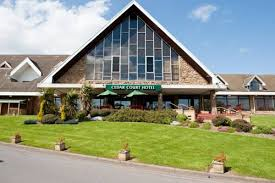
10th Annual North England Pain Medicine Group Meeting
Friday 22nd June 2018
Venue: Cedar Court Hotel,Lindley Moor Road,Elland, Huddersfield, HD3 3RH,
Phone: 01422 375431
Off M62 – Junction 24
This years programme has been organised by Dr.M. Kakkar covering many topical and highly relevant areas in the current practice of Pain Medicine.
For a detailed programme click here
To download and print a registration form click here
To visit the North England Pain Medicine Group website click here

EFIC Winter Cancer Pain School, Liverpool
October 16th-19th 2018
Course Aims
This course aims to develop skills of assessing and treating pain related to cancer and its treatment. This interactive course develops an evidence-based approach to assessment, and formulating diagnosis and designing a comprehensive management plan including pain management. The emphasis is on a multidisciplinary approach to managing pain related to cancer. Learning objectives of this course are in line with EFIC Core Curriculum for managing pain related to cancer as below.
- Identify sociocultural influences on the experience of cancer and cancer-related pain.
- Be able to compare and contrast the assessment and management of persons with cancer related pain and those with chronic non-cancer pain.
- Recognise the problems faced by cancer survivors who have persistent pain and management principles.
- Discuss the meaning and significance of the World Health Organisation analgesic algorithm for pain in cancer.
- Show awareness of and addressing unpleasant end-of-life symptoms including but not limited to, pain, nausea/vomiting, respiratory distress and itch.
- Recognise the essential role of close liaison with other teams, specifically from oncology, radiation oncology, neurosurgery, anaesthesia and palliative medicine.
- Define and distinguish between incident and incompletely relieved persistent pain.
- Discuss the role of cancer therapies in the management of cancer-related pain, including but not limited to: Radiotherapy, Radiopharmaceuticals, Chemotherapy, Immune therapy and Surgery.
- Discuss the use of other adjuvant analgesics in cancer pain including but not limited to: bisphosphonates, corticosteroids and ketamine.
There will be ample opportunity to interact with course faculty throughout the course
Click here for a detailed programme
Who Should Attend:
Trainees from Anaesthetic, Neurosurgery, Pain and Palliative Medicine. Consultants/Specialists in Pain Medicine, Palliative Medicine, GPs, Advanced Nurse Practitioners, and Senior Physiotherapists with a specialist interest in the management of chronic pain. Scientists, Pharmacists and other non-medical personnel with a professional interest in relation to management of pain related to cancer.
Royal College of Anaesthetist’s CPD approval (20 points) & Revalidation Matrix category:
2E03 Basic assessment and management of chronic pain
3E00 “Specialist interest area in Cancer Pain”
Course Material:
The Course Handbook will be available on the PRF Webpage with the lecture slides and carefully selected references (Available during the course and for 4 weeks after the course, to participants using a secure link via drop box). You will also receive a complimentary copy of the BMA award winning book “Practical Management of Complex Cancer Pain”.
Fee:
£450 – until 10th August 2018: then £525 (includes lunch and dinner)
Hotel Accommodation:
There are limited spaces available at the Radisson Blu Hotel at the discounted rate of £100.00 per night including breakfast. Should you wish to take advantage of his offer please use the link below when you register.
Alternatively there are a large number of hotels nearby in Liverpool city centre including premier inns and travel lodges.
To register online please visit http://www.painrelieffoundation.org.uk/events/
LIVERPOOL CANCER PAIN STUDY DAY 2017
A great success
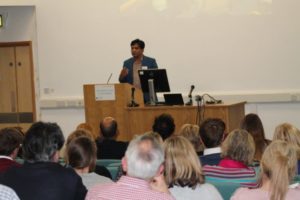
This is the first Liverpool Cancer Pain study day organised by Dr Manohar Sharma Consultant on the Pain Team at Walton Centre NHS foundation Trust and Dr Kate Marley from Woodlands Hospice in conjunction with the Pain Relief Foundation
The workshop attracted 65 delegates from all disciplines from across the UK and has proved to be a great success.
The aim of this study day was to promote awareness and education regarding management of cancer related pain which is otherwise very difficult to treat with conventional means. The study day helped the attendees understand when a patient may be considered for interventional pain management techniques including neuromodulation and neuroablative techniques.
Here are just some of the comments received
‘ On behalf of the Pain Relief Foundation I would like to take the opportunity to thank the entire Faculty for participating in the first Liverpool Cancer Pain Study day and making it a success without all your hard work, dedication and commitment the course would not be possible. It is both a pleasure and delight to work with such great people and to see such team work in educating other health professionals not only locally but nationally in these particularly demanding times. Manohar & Kate thank you for coming up with the programme and for your organisation and trusting us at the PRF to help you deliver another fantastic course’.
‘Very interesting lectures. It has added to my knowledge and what interventions are available for palliative patients, not all are available in my area.’
‘Great idea to have a day with multi-specialists attending’
‘All the makings of “good” was due to my level of knowledge of the subjects as this study day was well above training and experience.’
Click Here to see further comments
Liverpool Course on Management of Chronic Pain:
A Practical Approach 5th– 7th July 2018

Registration now open
This is an advanced practical and interactive course in clinical pain management for Pain Professionals and trainees who are aiming to develop their skills of assessing and treating complex chronic pain patients. The course will offer those who attend, the opportunity to develop an evidence based approach to assessment, examination and formulation of diagnosis, and how to design a comprehensive management plan. The course will be held at the Pain Relief Foundation (Clinical Sciences Centre) and the Pain Clinic (Walton Centre for Neurology and Neurosurgery).
Click here for a detailed programme of events
Who Should Attend:
Anaesthetic, Neurosurgery and Pain Trainees. Pain Consultants, GPs with Special Interest in Pain Medicine, Advanced Nurse Practitioners and Senior Physiotherapists with Specialist Interest in the management of chronic pain.
Fee: £350 for Early Bird registration (after 4th May, 2018, £450)
(Early registration secures first choice of workshops on days 1 and 2)
For further information and registration please visit the Pain Relief Foundation at their website www.painrelieffoundation.org.uk
LIVERPOOL CHRONIC PAIN COURSE 2017
GOES FROM STRENGTH TO STRENGTH
The 33rd Liverpool Course Annual Pain Course on Management of Chronic Pain was held 6th – 8th July the course attended by a range of disciplines which included, Consultants, GP’s, Anaesthetists, Nurses and Physiotherapists from both the UK and internationally.
The course was organised by Dr Sharma and Dr Rajiv Chawla both of whom are Consultants in Pain Medicine based at the Walton Centre, Liverpool with the support from the Pain Relief Foundation and Walton Centre.
Dr Sharama and Dr Chawla would like to thank to thank the Pain Course faculty and all for making this course possible and for making it another success in 2017 and would like to share this success.
Dear Pain Course Faculty,
Please click here to see the written course feedback from course delegates on the 33rd Annual pain course just completed. It will be only fair to share this with you all and reflect your contribution alongside your existing NHS commitments. Feedback is really as best as we can have (probably).
The mean feedback score for this course last year was 2.66/3.00 and this year it is 2.78/3.0. This is not a coincidence but reflection of what we have as an excellent pain service and unique practical multidisciplinary pain course.
Course was very well supported in terms of logistics by The Walton Centre and by the Pain Service and other disciplines and support from our secretaries, PMP team, Radiology, Theatres, Jefferson ward, OPD in Sid Watkins AND of course many patients who also took part. So this is a significant undertaking made only possible by your hard work and by those who are not even copied in this e mail. They will be thanked separately.
Sam Lipton Lecture by Prof Sam Eldabe was also the highlight in the field of Neuromodulation in NHS and made the evening most educational and entertaining.
This course reflects genuine cross organisation collaboration between Pain Relief Foundation and The Walton Centre and will like to thank Julie and her team at PRF in making it a great success. I wish this continues and reaches new heights.
Kind Regards
Manohar Sharma and Rajiv Chawla
On behalf of Organising Committees July Pain Course,
Pain Relief Foundation and The Walton centre
PLEASE CLICK HERE TO SEE THE CLASS OF 2017
LIVERPOOL CANCER PAIN STUDY DAY
10th NOVEMBER 2017
Clinical Sciences Centre, University Hospital Aintree, Lower Lane, Liverpool, L9 7AL

Aim of this study day is to promote awareness and education regarding management of cancer related pain which is otherwise very difficult to treat with conventional means. This study day will help the attendees understand when a patient may be considered for interventional pain management techniques including neuromodulation and neuroablative techniques.
There have been many significant advances in this field in particular over the last 5 years and this study day will provide ample opportunity for discussion and also includes an interactive workshop on a case study on cancer related pain and patients journey.
Click here to see a detailed programme of events.
Who Should Attend:
Anaesthetic, Palliative Medicine, Neurosurgery, orthopaedics and Pain Trainees. GPs with Special Interest in Pain Medicine, Advanced Nurse Practitioners, McMillan Nurses and Physiotherapists with Specialist Interest in the management of chronic pain
Fee:£50 – Consultants, GPs
£25 – Trainee doctors
Free – Nurses, Physiotherapists
For further information and registration please visit the Pain Relief Foundation at their websitewww.painrelieffoundation.org.uk
9TH ANNUAL NORTH ENGLAND PAIN MEDICINE GROUP MEETING
ANOTHER RESOUNDING SUCCESS
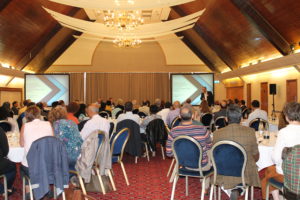
The North of England Pain Medicine Group (NEPMG), founded 8 years ago by Drs Sanjeeva Gupta and Manohar Sharma, is a supraregional Pain Medicine group established to cater specifically for the unique educational and networking needs of Pain Physicians in the locality of the North of England. The Group aims to foster closer collaboration between Pain Physicians to promote areas of good practice. It encourages and supports speakers and delegates drawn primarily from the region, contributing to an annual one day meeting of the highest quality.
This year’s meeting was held in the usual location of Huddersfield and again has proved to be a resounding success proving why this meeting has fast become a most important date in the annual pain conference calendar. Topics from this year’s programme included, ‘Legal Updates- consent and other issues’, ‘Interagency Team’s reflection on Management of patients with combined chronic pain and substance misuse problem.’ and ‘6 honest serving men Spinal cord stimulation – the Salford experience’ to name but a few. Listed below are feedback comments received from attendees
‘Good topics – variety – discussion’
‘Very good all day thanks’
‘Neurostimulation The 6 honest serving men. SCS legal updates. Very informative and interesting’
‘Legal updates very interesting. Teams reflections’
‘Different perspectives from different consultants’
‘Great venue’
‘Well organised, and variety of topics’
‘Good location, food and lecture content and video presentations’
‘Interaction and small group format’
‘Enjoyed the variety of the sessions’
For further information regarding the North England Pain Medicine Group please visit their website at www.north-england-pain-medicine-group.co.uk/

9th Annual North England Pain Medicine Group Meeting
Friday 19th May 2017
Venue: Cedar Court Hotel,Lindley Moor Road,Elland, Huddersfield, HD3 3RH,
Phone: 01422 375431
Off M62 – Junction 24
This years programme has been organised by Dr.R.Krishnamoorthy covering many topical and highly relevant areas in the current practice of Pain Medicine.
For a detailed programme click here
To download and print a registration form click here
To visit the North England Pain Medicine Group website click here
Spinal Cord Stimulation for Chronic Pain
(SPINAL IMPLANTS FOR CHRONIC PAIN)
Purpose of this article
The purpose is to raise the awareness regarding available treatments for chronic and intractable pain which otherwise may be poorly controlled or managed with usual medical treatments including medications. There have been many advances in the field of spinal implants to control chronic pain and when applied in conjunction with other supportive treatment including education and rehabilitation based approaches to support self-management, many patients can expect improvement in quality of life. This treatment is considered cost effective and is available on NHS and supported by NICE (National Institute for Health and Care Excellence, London).
Introduction to chronic pain
Chronic pain is highly prevalent. It is estimated that 14 million people live with chronic pain in England alone. In 2011, 31% of men and 37% of women reported persistent pain. Of these, one in four (3.5 million) said that their pain had kept them from usual activities (including work) on at least 14 days in previous three months. A person living with pain will have a very poor quality of life – much worse than other conditions, and as bad as significant neurological diseases such as Parkinson’s.
Chronic pain is a complex long-term medical condition. Chronic pain has huge impact on daily activities, disrupts family life and impacts on ability to work. Chronic pain is not only a physical condition but also a disease in itself. The pain can be localised in a small part of body or diffuse. The severe unremitting chronic pain affects social functioning, workplace roles and drains mental performance to such an extent that patients can feel depressed and isolated. Patients can become suicidal with the burden of their symptoms. Severe chronic pain has an impact on life expectancy. The 2008 Chief Medical Officer report states that 25% of pain sufferers lose their jobs; 16% of sufferers feel their chronic pain is so bad that they sometimes want to die.
Treatment of chronic pain
There are teams of trained Pain Specialist present in primary, secondary, and tertiary care pain centres for helping people with chronic pain to support managing their pain and offer pain relief. There is immense background knowledge about prevalence of chronic pain and impacts of pain relief technology available that could reduce burden and suffering from chronic pain. In particular, pain related to altered nerve function or dysfunction or damage to nerves (neuropathic pain) can be successfully controlled with spinal implants especially when patients do not derive benefit from existing usual medical treatments. Various examples of neuropathic pain include persistent pain control following spinal surgery for sciatica or disc related pain, complex regional pain syndrome, trauma or surgery leading to nerve damage, post amputation stump pain, pain following spinal cord injury, post herpetic neuralgia and peripheral neuropathy. These types of pain are typically poorly responsive to usual painkillers including nerve pain killing medications (antiepileptic, antidepressants and morphine based pain killers) and some of the patients while having some pain relief gets significant side effects. This means there is unmet need for relief of patient with chronic pain.
Spinal Cord stimulation (SCS)
Spinal cord stimulation (spinal implant to control neuropathic pain) is a way to control nerve injury related pain (neuropathic pain). Norman Sheily attempted this first in 1967. He placed a wire (lead) with electrical contact (with ability to pass electrical pulses through spinal cord in a much localised area to control pain) in spinal cord in a patient suffering from cancer related pain and patient had pain relief lasting a couple of days. This technique has since been significantly refined and improved. There is as well better understanding as how this treatment works in patients with nerve injury related pain (neuropathic pain).
There have been a variety of leads and batteries available on the market for control of neuropathic pain. It essentially means implantation of fine wires with ability to pass electrical pulses into the spinal cord to interfere with pain signals from painful area passing to the brain. This interference means that patient is not able to feel the pain. These wires are connected to a battery, which powers the SCS (Spinal Cord Stimulation). This is controlled with hand held remote device from outside. None of the components are visible from the outside apart from the remote control to communicate with the device. Over the last ten years there has been significant advance in understanding of mechanisms as how SCS helps and also with improved hardware and software i.e. type of electrical pulses, many more patients are now in a position to receive good pain relief.
Advances have been made not only with spinal cord stimulation leads but also with the batteries. In the past SCS was powered using radio frequency coupling mechanism and now with the improvement of battery, it means battery carrying a charge can be implanted with out need for charging from outside. These may need replacing after 5-7 years depending on use. Batteries now have been further improved and these can be charged from outside meaning that these can now last more than 10 years and hence avoiding need of an operation to replace a flat battery. There is also improvement with the battery software, such that with change in posture batteries will automatically adjust electrical pulses and there is minimal postural variation in electrical pulses or surges felt by patients (sharp pain or loss of treatment effect) and hence improving patient’s experience.
New advances in technology
Another advance in the field of SCS has been the ability to target stimulation (tingling sensation) in areas otherwise difficult to target with conventional SCS. It has been realised that with conventional spinal cord stimulation it is difficult to pass pleasant electrical pulses to control pain in the foot, groin, or in very localised area of chest or abdomen. The new technology includes dorsal root ganglion stimulation i.e. spinal cord stimulation of the dorsal root ganglion and is now established and successful. This means patients, who could not be offered this treatment 4-5 years ago, now are able to access treatment with possibility of pain relief and improved quality of life.
Further advance in this field has been i.e. High frequency spinal cord stimulation which passes electrical pulses at 10 kHz frequency and patients typically do not feel any paraesthesia or tingling sensation, but only pain relief. This treatment modality has also been studied in a rigorous scientific and controlled manner and pain relief is not only comparable but seems superior to existing SCS technology. This was shown in randomised controlled trial in nearly 200 patients, and study data is now available lasting over 18months and showing good pain relief as well as safety of the device. Many device manufactures are introducing further improved electrical waveforms with potential for improved quality of pain relief.
Another advance in this field is to use wireless technology to minimise the amount of SCS hard ware being implanted (SCS device without a battery) and hence minimising the extent of surgery and surgery related side effects. This study is due to start soon to see if this holds promise for future.
There is significant potential to be involved with and lead exciting research in this field at Pain Relief Foundation and The Walton centre Pain Service.
Summary
There have been significant improvements and understanding of spinal cord stimulation and impact of this treatment on neuropathic pain. There have also been significant improvement and refinement to hardware as well as stimulation paradigms (software) i.e. the characteristics of electrical pulses used to treat chronic nerve pain. This essentially means that patients can now be offered better pain relief compared to recent past. This field is likely to expand and improve further because of significant interest and research in this field and this is exciting time to support research in this filed.
33rd Liverpool Course on Management of Chronic Pain:
A Practical Approach 6th– 8th July 2017
Registration now open
This is an advanced practical and interactive course in clinical pain management for Pain Professionals and trainees who are aiming to develop their skills of assessing and treating complex chronic pain patients. The course will offer those who attend, the opportunity to develop an evidence based approach to assessment, examination and formulation of diagnosis, and how to design a comprehensive management plan. The course will be held at the Pain Relief Foundation (Clinical Sciences Centre) and the Pain Clinic (Walton Centre for Neurology and Neurosurgery).
Click here for further information and registration
The European Pain Federation EFIC® – Winter Cancer Pain School, Liverpool 2016
The European Pain Federation EFIC® – Winter Cancer Pain School, Liverpool was held 11th – 14th October the course was fully booked with a waiting list and was attended by 20 doctors from across Europe and 12 doctors from the UK.
The course was organised by myself Dr Sharma, along with Dr Kate Marley, Consultant in Palliative Medicine, University Hospital Aintree,Liverpool and Dr Chris Wells a Pain Physician, Rodney Street, Liverpool and current president of EFIC. I would like to thank would like to thank the Pain Course faculty and all for making this course possible and for making it another success in 2016
Dear EFIC Cancer Pain Course Faculty,
It was immense pleasure to have your company in Liverpool and share your experience in this field which has been very well received and appreciated by the course delegates. I have had a quick look at the feedback and am delighted to say that it is excellent and reflects your valuable contribution and support without which it is not possible.
This school was very well supported by Dr Chris Wells (EFIC President), Faculty from EFIC, Dr Marley from Aintree Palliative Medicine (Woodland’s Hospice), Walton Centre colleagues and faculty from UK.
It is a rare and unique opportunity to share knowledge and experience in this field in such detail (lectures, case discussions, live case presentations on recently treated cases, pain in cancer survivors, group work etc).
I am sure this will make positive impact on those who attended, to further help patients with cancer related pain in UK and Europe.
Pain relief foundation (Julie and Brenda) and Walton centre has provided immense support and motivation towards this and it is really appreciated
Again many thanks for your contribution in making this a great success!
Regards
Dr Manohar Sharma
Click here to read feedback comments




